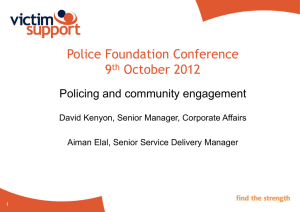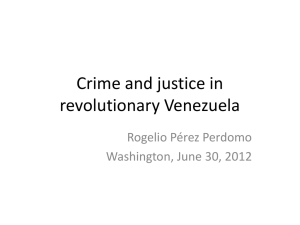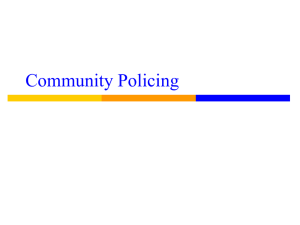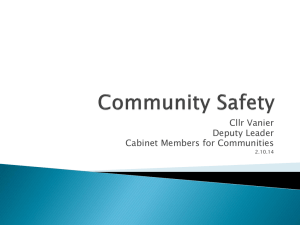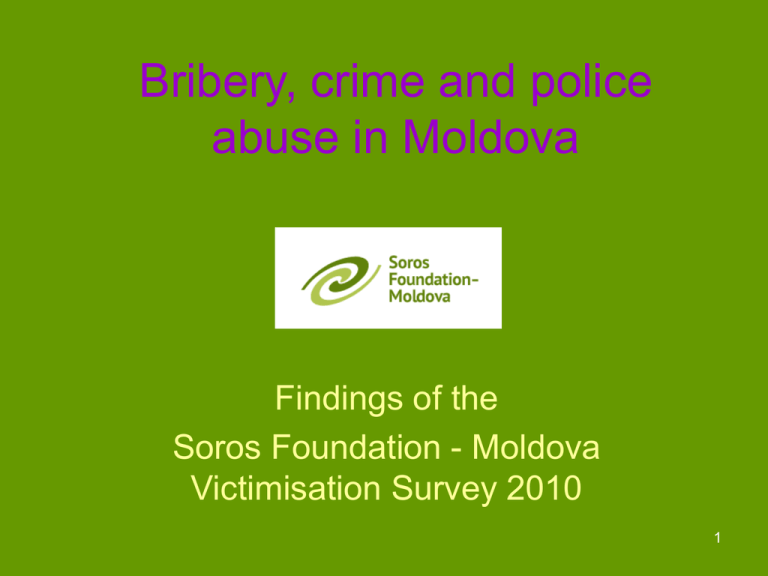
Bribery, crime and police
abuse in Moldova
Findings of the
Soros Foundation - Moldova
Victimisation Survey 2010
1
Introduction
• The Soros Foundation - Moldova (FSM)
Victimisation Survey 2010 seeks to:
– Measure levels of victimisation
– Measure perceptions of the criminal justice
system
– Measure confidence in police and justice.
2
Survey Methodology
• Representative survey of the population of
Moldova carried out over March-April 2010
• Households selected using complex sample
design with stratification and clustering, covering
37 urban locations and 134 rural locations, and
resulting in 3018 interviews
• Data subsequently weighted by age, sex and
rural/urban status according to the population of
Republic of Moldova aged 16 – 75 years as
published by the National Bureau.
3
Analysis
• Victim numbers estimated with weighted data
– Compared with 2008 survey where appropriate
– Margin of error on both surveys +/- 1.8%
• Regression analysis and significance testing
carried out to identify significant relationships
between variables
– “Significant” means the relationships identified cannot
be ascribed to chance
– All relationships identified are to the 95% probability
i.e. there is only a 5% chance they are random.
4
Interpretation
• Findings discussed with FSM criminal
justice think-tank members to interpret
meaning in Moldovan context
• Implications and recommendations based
on thorough understanding of Moldovan
criminal justice context.
5
Crime perceptions
• “Crime has not improved, crime has become
more violent”
• Most serious negative perceptions associated
with blaming low police qualifications for
perceived crime rise
• The perception that personal safety has
worsened also associated with blaming lower
police qualifications for crime
This suggests that addressing the issue of police
qualifications will have a favourable impact on those
feeling most personally threatened by crime.
6
Criminal justice perceptions
• Only 6% see an improvement
in all parts of the criminal
justice system
• The average rating out of five
people give for the police is
2.97, for prosecutors 3.01,
judges 3.02, and defenders
3.15.
Reforms have not had a
favourable impact – or have
failed to outweigh other factors
which have negatively
impacted on public confidence
"The state effectively
protects me"
Yes
No
7
Victimisation
• Almost half (46%) of Moldovan people have
been a victim of at least one crime in the last five
years; a third (33%) were a victim in 2009
• This implies 942 500 people victim to at least
one crime in 2009 and 1 313 811 over the last
five years
• This compares to the 127 167 crimes recorded
by the Ministry of the Interior over the last five
years. This result is more than 10 times higher
than recorded crime
Reporting rate one third does not fully account for
discrepancy
8
Car theft
Scooter theft
Sexual abuse
Robbery
Bicycle theft
Attempted housebreaking
Trafficking
Attacks and threats
Theft out of motor vehicle
Housebreaking
Other theft
Stock theft
350000
300000
250000
200000
150000
100000
50000
0
9
Victimisation Trends
• Women comprise the majority of victims of
crime and are more likely to be victims
• Young people are more likely to be victims
• Wealthier, urban educated more likely to
be victims
• Minority status not a factor
• A small proportion of people being
repeatedly victimised accounts for the
majority of crime counts in Moldova
10
100%
90%
17%
38%
80%
70%
60%
29%
60%
50%
40%
30%
54%
62%
20%
40%
10%
0%
Percentage of
people
No crimes
0%
0%
Percentage of
victims
Percentage of
crimes
One crime
Two or more crimes
11
Trafficking
• 67000 experienced trafficking during 2009
• 1 in 12 reported the incident to the police
– more than half reported to the police of the country
they were in, not Moldova
Police should have agreements in place with
trafficking destination countries
• Households who experienced trafficking were
more than three times as likely to have been
attacked or threatened
Witness protection should be available to trafficked
persons
12
Theft out of motor vehicle
• 14% of households with cars experienced
theft out of a motor-vehicle in last 5 years
– Most (71%) do not report
– People who have experienced theft out of
motor vehicle are less likely (30%) than
people who are victims of other crimes (34%)
to say that police protect them
Reducing theft out of motor vehicles would
have a strongly positive impact on confidence
in the police
13
Stock theft
• Stock-theft triples the risk of burglary (from 5%
to 15%). In other words households who have
experienced stock-theft are three times more
likely than other households to also experience
a burglary.
– This suggests that the crimes happen at the same
time, or that stock-theft is a risk factor for burglary.
• Living in smaller households, being poorer
(lower than median income), and being a
member of the majority Moldovan/Romanian
group all increases the likelihood of stock theft.
14
Burglary
• People who have experienced burglary
more than once are less likely to report the
incident to the police
– Having some form of physical protection such
as burglar bars reduces risk slightly
– Having dogs also reduces risk
– Vigilant and caring neighbours offer best
protection
15
Sexual abuse
• 35 000 women in Moldova have been sexually
abused in the last 5 years
– Only 6% reported to the police
• A third said they were afraid and two fifths said they police
would do nothing
• 15% involved more than one person and 48%
involved a stranger
– More than half occurred neither at home nor work
• The risk of women experiencing physical attacks
or threats is three times higher among sexual
abuse victims
16
Threats and attacks
• Two scenarios of typical incidents
– a known, single unarmed perpetrator away
from home
• suggestive of domestic or neighbourhood disputes
being aired in public
– unknown perpetrators possibly armed and
possibly located closer to home.
• suggestive of territorial gangs located in the
victims’ neighbourhood.
• associated with drug prevalence
• associated with victims under 30
17
Bribery
• Together almost a third (30%) of people in
Moldova were asked for or offered a bribe
or did both in 2009
• Half (50%) of people under 30 who live in
Chisinau were asked for or offered a bribe
or both in 2009
• “Serial bribers” 7% paid 56% of the total
bribes paid in 2009
18
Bribery among police
• 8% of people who had contact with police
in the last five years were asked for or
offered a bribe in 2009
• 19% of people beaten by police in the last
five years were asked or offered a bribe in
2009
19
Bribery among judges
• Just under 1% of population = 20 228 people
said they were asked for or offered a bribe
– There are only 433 judges
– Contact with judges rare
• 2008 survey 5% in last 3 years had contact with judges
Half the people going to court in Moldova each year
compromise the case in which they are involved by a bribe.
• 41% of people say it is “very likely” that a person
could solve a problem by a bribe to a judge
20
Police abuse of suspects
• 15% of men detained in 5 years beaten
– 27 000 men were detained and beaten over the last
five years.
• 40% of men detained in last 5 years were either
beaten or maltreated & 21% of women detained
say they were maltreated by the police
– over 71 000 men and close to 16 000 women were
detained and mistreated over the last five years
• Failure to explain rights, call lawyer associated
with mistreatment
Urgent reform required
21
Summary
• High levels of fear
• Much higher levels of actual victimisation
than indicated by official data
• Pervasive climate of bribery extending
even to the judiciary
• High levels of police abuse, poor police
performance on human rights & protection
of the law measures
Criminal justice in crisis?
22

